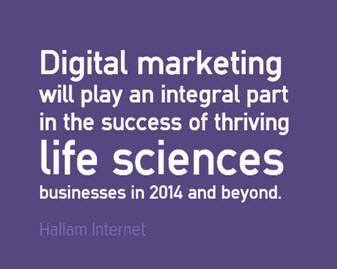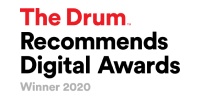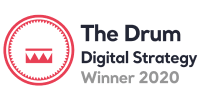The life sciences sector – comprising pharmaceutical businesses, biotechnology and medical technology such as medical devices – is rarely thought of as a leader in digital marketing.
But it is a sector about which the UK government is very positive and one where the UK economy stands to gain greatly. With renewed investment in the sector and a refreshed approach to its growth via the Strategy for UK Life Sciences initiative, life sciences businesses need to acknowledge the potential of digital marketing in promotion of their own businesses and of the sector as a whole.
The life sciences sector stands to gain a lot from an investment in digital marketing, as I will go on to explain here.
Life Sciences: A Sector of Opportunities
 According to a recent report by finance giant Deloitte, the life sciences sector is in a very healthy position in 2014, stating that “an overview of recent sector performance shows that it is favourably positioned to achieve success in 2014 and beyond.”
According to a recent report by finance giant Deloitte, the life sciences sector is in a very healthy position in 2014, stating that “an overview of recent sector performance shows that it is favourably positioned to achieve success in 2014 and beyond.”
This apparent prosperity is driven by an increasing demand for the life sciences’ products and services. An aging population has been cited as one driver for growth, as well as technological advancements and product innovation.
This prosperity and vision of the future of life sciences sets it apart as one of the key sectors for the UK economy, as highlighted by the government’s commitment to growing the sector in its Strategy for UK Life Sciences project which began in 2011.
But whilst demand is increasing and the future looks promising, the life sciences sector as a whole is failing to keep up with other sectors in terms of digital – and is therefore missing out on opportunities to showcase its value to a wider audience and to take advantage of the investment potential coming from governmental funding.
Digital Marketing in the Life Sciences Sector: Why?
Digital marketing affords all businesses the opportunity to play on a level playing field. Whether you’re a global life sciences business like 3M or a much smaller company operating in your own niche, the same tools are available to use.
Traditionally, the life sciences sector has been slow on the take up of digital technologies – despite being one of the most innovative sectors going. It’s approach to digital is often very fragmented, and at worst life sciences companies are adopting a scatter-gun approach with no real aim, or no digital marketing at all.
This is surprising, for one main reason: The life sciences sector is almost entirely reliant on its ability to communicate new innovations and technologies. To omit digital marketing is to ignore one of the world’s greatest communication channels – the internet.

How can the life sciences sector use digital marketing?
Life sciences businesses should be taking advantage of digital marketing. Below are two key areas where digital marketing should be a focus:
1) Sales
The promotion and consequent sale of life sciences products and services can be greatly boosted through the use of digital marketing.
Did you know, there are 15,671 groups about ‘medical’ on LinkedIn at the time of writing this article. That’s 15,671 places that people are discussing a topic highly relevant to the life sciences sector. Savvy life sciences businesses should be there, adding value to those discussions and positioning themselves as the experts in their field – which is a strong facilitator of future sales.
According to Google, there are 5,400 searches every month for ‘pharmaceutical companies’ – you can bet that a high proportion of those searching are looking for companies from whom to buy. Indeed, higher intent phrases (search phrases where the user displays a greater propensity to buy) also have strong levels of monthly search traffic – such as ‘buy medical equipment uk’.
It’s not just LinkedIn and Google that represent strong opportunities for life sciences companies to sell online. Blogging and content marketing, such as the creation of whitepapers and informational videos, will position these businesses as experts and investment in areas such as search engine optimisation (SEO) will ensure their products and services reach a wider audience.
2) Positioning
With so many life sciences businesses in the UK (did you know the sector accounts for over 165,000 jobs in the UK alone?), any company that wants to stand out from the rest needs to invest in digital marketing.
The showcasing of expertise is one of the most valuable outcomes of social media – and one that is used by businesses across all sectors, not just life sciences. By displaying expertise online, companies can communicate their value to a nationwide and even global audience.
For example, 3M’s Health Care Academy is an online platform for heathcare professionals to gain access to important information and valuable training. As the provider of said training, 3M positions itself as a thought leader in its field whilst perhaps more cleverly still, they are training up the very people who may go on to buy from them in the future.
But huge initiatives aren’t the only way to position a life sciences business as an expert in its field.
Many companies in today’s digital landscape are making use of tools such as Twitter, where the accounts you follow and who follow you are strong indicators of the type of business you are. Your brand affiliations in this way can showcase your position in the life sciences community. By sharing highly valuable, expert content on Twitter, life sciences businesses can increase their visibility and gain valuable exposure.
By sharing great news stories and updates across the web, life sciences businesses contribute to the overall understanding of the sector and can set themselves apart as individual exemplary businesses – ripe for investment and PR should the opportunity arise.
Life Sciences on Digital Marketing: Where to Start?
So there are numerous opportunities available through digital marketing for the life sciences sector. Here, I’ve only touched on the very top level suggestions but dig a little deeper and you will spend hours considering new ventures, tools, initiatives and channels through which life sciences can sell to their customers and promote their own businesses and their sector.
Tackling these opportunities head-on will require a time investment, and it starts with a strong plan. By creating a strong strategy with a clear roadmap to show the way, life sciences businesses can approach digital marketing one step at a time.
This plan needs to begin with a strong understanding of the life sciences target audience. Who are you trying to speak to? What can you add of value into their existing conversations? How and where can you start new conversations with them?
Next, what tools are available to you and appropriate to your audience? No doubt, much of your target audience is on Facebook but are they there to look for your products or services, or are they just there to catch up with friends and family? Understand what channels your audiences uses and where it’s appropriate for you to engage with them.
Implementation of the strategy is obviously an integral part of its success. Having the plan is one thing but life sciences companies will need to invest in time and resource to bring those plans to fruition. Internal resource can be a good starting point, but more and more life sciences businesses are turning to digital marketing agencies to manage their digital marketing, allowing them to focus internal resource on the business in hand.
Finally, life sciences businesses investing in life sciences must continually measure, analyse and refine what they’re doing. This means utilising tools such as Google Analytics, LinkedIn Insights, Followerwonk and so on to assess the outcome of their efforts in relation to the goals laid out in their plans. As a sector which has yet to fully invest in digital, front runners at this stage will refine their methodology long before those who follow months or years down the line – meaning now is the time to test, try and assess.
If you’d like more information for life sciences businesses on how to use digital marketing, look out for our life sciences events (we regularly work with Medilink, for example), or contact us via our contact page.






